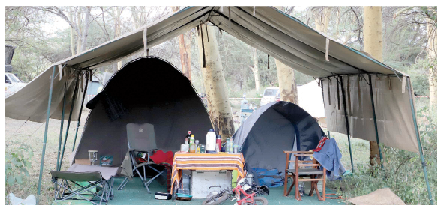Camp, guide, explore, discover

Remember the good old days when there were no smart phones and video games and children would spend hours up a tree or playing with mud or even laying in the grass? Nostalgic, right. But in the urban setting, you wonder how your child can enjoy such an experience.
Well, here comes camping! Some parents are using camping to help children discover the benefits of nature and also bond with them as they share knowledge and learn new skills.
“Outdoor experiences are great as they enrich your child’s perception of the world. It is also an opportunity for them to step out of their comfort zones and be exposed to new activities and experiences that they may not be familiar with. In addition, it is also a chance to try new things and discover new hobbies and passions,” Kenny Gichuru who goes camping with his son says.
Wild learning
This love for camping began when he started working as a tour guide when he was 20 years old. He would travel a lot to various destinations in Africa. He learnt various skills, such as how to cook from the chefs that he met and for him, camping too was a way to reconnect with nature and explore the world.
“My son is five years and I have decided to train him and let him enjoy these experiences early. We enjoy camping and being outdoors in national parks as well as different events like 10 to 4 Mountain Bike Challenge as well as Rhino Charge,” he says.
Whether you have a baby, a toddler, or a preschooler, Kenny believes that its never too early to get your children to do outdoors and the sooner you begin camping with them, the better they learn earlier. Children connect simply to the beauty and the charm of what nature brings. Having lived in a farm that has enough space, he first began to train his child at home to camp. His child’s first camping experience was at the age of two-and-a-half years.
“He would spend the weekends with his elder sister sleeping outside and getting used to being in nature, see insects as well as different birds and reptiles. I also bought him a chart that has drawings of animals living in the backyard and he was able to know what the insects are. This made him have knowledge and piqued his curiosity,” he continues.
When preparing for the trip, Kenny ensures that he has packed warm clothing, especially when they camp in high altitudes. He also ensures that he has carried plenty of water to hydrate, a first aid kit with painkillers as well as food and fruits. For a tent, they carry a normal tent, but ensure that it is a nested camp with a ground sheet where children can play and be protected from thorns.
“The main thing is to ensure that we have warm clothing such as a good jacket, woolen socks and a heavy blanket because the last thing that you need is to catch a cold,” says Kenny.
Cheap and flexible means
Even as you worry about their safety while camping, Kenny says this shouldn’t come in the way of allowing children discover nature by themselves. He recalls when his son would touch cactus and sometimes he would get pricked. He has also been stung by bees twice, but since Kenny has a medical background, he has been able to ensure that his son is safe during the camping experience.
“You can never be safe enough. If you think of the dangers that your child will come across when camping, then you will always be scared. Just take a chance and after a while he will know how to move around and will identify the things that are harmful and will avoid it himself,” he advises.
For Kenny, camping is the most affordable way of seeing the world and minimises the expenses of staying in a lodge. One is also able to access remote places since it’s flexible and that’s the greatest advantage of camping. For instance, one can spend Sh40,000 for 18 days traveling with six people.
“With camping, you also decide where to stay. You don’t need reservations in a lodge and one can travel at will. There are many places in Kenya where you can just set up your tent and leave in the morning. Camping also makes you become independent because if you like a place, you can spend another day. I have a land cruiser too and that reduces expenses with fuel and car maintenance,” he explains.
Let children learn
Just like teaching them everything about life, when the children are young, it is vital to teach them how it all goes in camping. For instance, when packing for the camping trip, explain to your children how important it is to be prepared. Create a checklist with them and ensure that they put everything in the vehicle for the trip, such as tents, fishing equipment, cooking equipment, bug repellants, barbecue grill, first aid kit, sunscreen, hygiene tools or any prescription medication.
Once you are at the destination, ensure that you talk to your child on setting up a tent and assist them to be able to set up the tent. In addition, print out the map of your camp ground that shows where everything in the entire campsite is such as restroom or any other significant location. Ensure too, that your children can get to the locations and back again on their own.
“Walk them through every activity that you will be doing during the trip such as going for nature walks, camping activities and building campfire. In addition, train your child to stay within eyesight and set up a plan if they get lost—you can have them wear a whistle around their necks in case this happens for precautionary measures,” advises Kenny.
In instances where you are not the only one camping, be considerate with communal places such as kitchen or washrooms.
“Leave the toilets clean, don’t pick soap that has been forgotten in the bathroom and don’t be noisy too. Most people would like to have rest and maybe they want to sleep early. Watch your volume as you talk or even music because sound travels faster in the wild. Be careful too about water because it’s limited. It’s also good to also say a polite hello to other people,” he says in ending.












